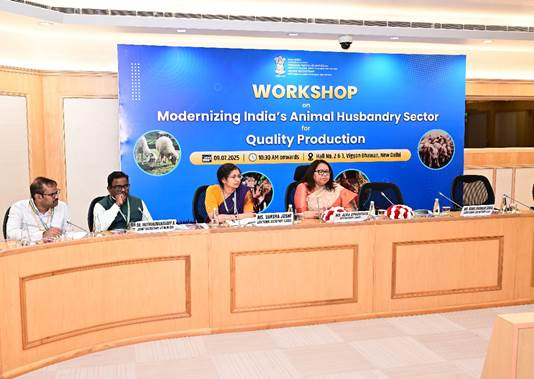Nationwide Digital Outreach Educates Livestock Farmers on Health, Productivity and Innovation
Smt. Alka Upadhyaya, Secretary, DAHD, also joined the session, reflecting the ministry’s commitment to strengthening grassroots-level engagement in the livestock sector.

- Country:
- India
In a landmark initiative aimed at empowering India’s livestock and dairy farmers through digital means, the Department of Animal Husbandry and Dairying (DAHD), under the Ministry of Fisheries, Animal Husbandry and Dairying, hosted a Virtual Awareness Program on July 11, 2025. The program was conducted through the extensive Common Service Centres (CSCs) network and reached over 1 lakh farmers across 2,000 locations in the Western and Southern States/Union Territories.
The session was chaired by Prof. S.P. Singh Baghel, Hon’ble Minister of State for the Ministry of Fisheries, Animal Husbandry and Dairying, and the Ministry of Panchayati Raj. Smt. Alka Upadhyaya, Secretary, DAHD, also joined the session, reflecting the ministry’s commitment to strengthening grassroots-level engagement in the livestock sector.
Enhancing Farmer Engagement and Knowledge Transfer
Highlighting the significance of the initiative, Prof. Baghel described the program as a vital step in bridging the gap between research institutions and rural livestock practitioners. “This is not just a lecture series — it is a knowledge revolution where we bring lab innovations directly to the land,” he said. The Minister engaged in live interactions with livestock farmers from various states, discussing their experiences, veterinary needs, and familiarity with government schemes.
One of the key focus areas of the session was the use of Sex-Sorted Semen (SSS) technology, a revolutionary tool in selective animal breeding. Prof. Baghel noted that the government has drastically reduced the price of SSS, making it affordable and widely accessible to small and marginal farmers. The application of SSS is expected to significantly enhance milk yield by increasing the population of female calves — a long-term strategic move to boost dairy productivity in India.
Secretary Emphasizes Disease Prevention and Breed Quality
Delivering an insightful address, Smt. Alka Upadhyaya emphasized the importance of preventive veterinary care, especially the timely vaccination of livestock. She highlighted the danger posed by zoonotic diseases — infections that can be transmitted from animals to humans — and urged farmers to follow proper hygiene and vaccination protocols.
She also outlined the government’s focus on advanced breeding techniques, including embryo transfer and artificial insemination, to improve native cattle breeds and enhance productivity. “The future of livestock farming lies in innovation, prevention, and education. Programs like these ensure that even the remotest farmers benefit from national expertise,” she said.
Broad Regional Participation and Digital Inclusivity
The session saw enthusiastic participation from farmers in Gujarat, Andhra Pradesh, Karnataka, Maharashtra, Rajasthan, Telangana, Tamil Nadu, Goa, Puducherry, Dadra and Nagar Haveli, and Daman and Diu. Farmers were connected via CSCs — government-supported digital service hubs that enable internet access and e-governance services in rural areas.
The use of CSCs allowed the program to transcend logistical barriers and create an inclusive, digitally-enabled awareness platform. Educational content included expert sessions, video tutorials, and Q&A interactions covering:
-
Breed improvement practices
-
Vaccination schedules
-
Zoonotic disease prevention
-
Sanitation and hygiene management
-
Livestock nutrition and care
Aligning with National Livestock Goals
This virtual outreach aligns with the government’s vision of “Atmanirbhar Krishi” (Self-Reliant Agriculture) and “Sahakar Se Samriddhi” (Prosperity Through Cooperation). DAHD is increasingly leveraging digital infrastructure to bring policy initiatives, financial schemes, and scientific knowledge to farmers without the need for physical training camps.
The initiative is also part of broader efforts to meet the objectives of the Rashtriya Gokul Mission, National Animal Disease Control Programme (NADCP), and Dairy Development Schemes, which together aim to make India’s animal husbandry sector more resilient, sustainable, and globally competitive.
Looking Forward: Digital India Meets Rural Animal Health
The success of the July 11 program demonstrates the transformative potential of combining digital platforms with agricultural extension. By creating a direct communication channel between policymakers and farmers, the government is building a more informed rural community capable of making scientific decisions in livestock care.
With livestock contributing nearly 4.5% of India’s GDP, such initiatives are not only timely but essential. They pave the way for an era where even remote farmers can access expert advice and government support at the click of a button.
The Ministry has announced its intention to conduct similar digital awareness drives on a regular basis, expanding to northern and northeastern states in the next phase. The goal is clear: a digitally connected, well-informed, and self-reliant livestock sector that contributes meaningfully to rural prosperity and national food security.










